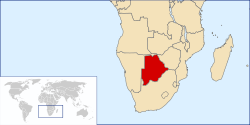| UN Security Council Resolution 572 | ||
|---|---|---|
 Botswana | ||
| Date | 30 September 1985 | |
| Meeting no. | 2,609 | |
| Code | S/RES/572 (Document) | |
| Subject | Botswana-South Africa | |
Voting summary |
| |
| Result | Adopted | |
| Security Council composition | ||
Permanent members | ||
Non-permanent members | ||
| ||
United Nations Security Council resolution 572, adopted unanimously on 30 September 1985, after recalling Resolution 568 (1985) and noting a report from a mission to Botswana appointed by the Secretary-General, [1] the Council endorsed the report regarding a South African attack on the country.
Contents
The resolution demanded compensation for Botswana, [2] and requested international assistance from Member States and organisations for the country in the areas identified in the report. It also asked the Secretary-General to keep the situation under observation.